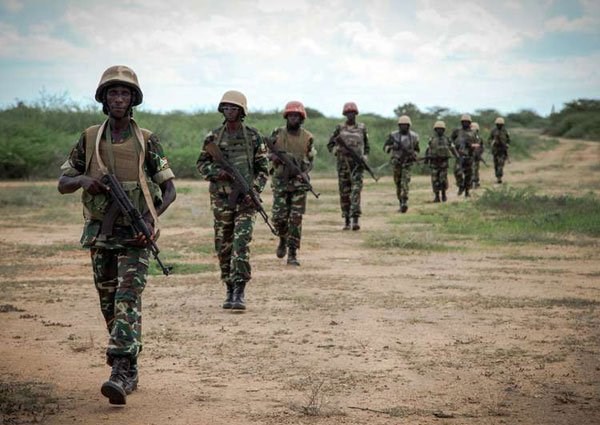Foreign Affairs CS Amina Mohamed says the international community should continue funding African Union forces in Somalia if it wants lasting peace in the region.
In a speech delivered at the UN Headquarters in New York on Thursday, Ms Mohamed argued funding cuts announced by the European Union to the Somali mission go against efforts of stabilising the continent.
“It is important that we continue funding Amisom and other peace initiatives in Africa because any financial cuts are inconsistent with the objective of achieving peace in the continent,” she said.
She spoke during the open debate on peace building in Africa, a session by the UN Security Council.
“I hope this matter will continue to receive the attention of the UN Security Council,” she added.
 Ms Mohamed was referring to the recent financial cuts announced by the European Union earlier in the year.The EU, through the African Peace Facility, has been paying Amisom troops in Somalia a monthly stipend as well as sustaining other non-military staff.
Ms Mohamed was referring to the recent financial cuts announced by the European Union earlier in the year.The EU, through the African Peace Facility, has been paying Amisom troops in Somalia a monthly stipend as well as sustaining other non-military staff.
But the EU in January told the mission — created in 2007 to secure the nascent Somali government and which now has 22,000 soldiers — that it would cut by 20 per cent the financial aid it gives to Amisom, citing financial hardships.
Amisom was created by the African Union to fight against Somali militants al-Shabaab, but it is technically a UN mission because it receives its mandate from the UN Security Council which is to currently run until March 2017.
Recently, the AU launched its Peace Fund during the summit in Kigali this month, but it is unclear when it will be operational.
It later emerged last month that the other payment has in fact been delayed forcing each contributing country to dip into its own pocket.
Kenya, Uganda, Djibouti, Ethiopia and Burundi are the troop contributing countries to Amisom.
Yet as Ms Mohamed spoke to the UNSC, she also argued that Africa’s long-term stability will rely on how the international community supports various economic and political programmes on the continent.
MILITARISED RESPONSES
“Less emphasis should be placed on militarised responses to conflicts in Africa. Emphasis should instead be placed on political engagement and development approaches,” she argued.
The UN has previously passed resolutions to this effect but the CS said it will depend on how they are implemented.
“Enhancing economic development is recognised as building resilience to risks and vulnerabilities in fragile States.
“Peace-building has therefore to contribute to maximisation of trade, investment and development opportunities.”
Ms Mohamed was addressing the UNSC as current chair of Peace Building Commission, an intergovernmental advisory body created by the UN to help support efforts of countries emerging from war and conflict and often acts as an arena for the international actors, both governments and non-governmental organisations, to collaborate and raise funds.
Kenya is the current chair of the commission, which is presently looking into the affairs of Burundi, Sierra Leone, Guinea Bissau, Central Africa Republic and Liberia.































